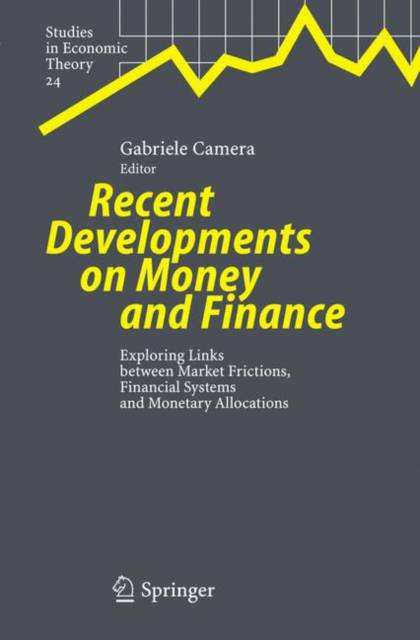
- Afhalen na 1 uur in een winkel met voorraad
- Gratis thuislevering in België vanaf € 30
- Ruim aanbod met 7 miljoen producten
- Afhalen na 1 uur in een winkel met voorraad
- Gratis thuislevering in België vanaf € 30
- Ruim aanbod met 7 miljoen producten
Zoeken
Recent Developments on Money and Finance
Exploring Links Between Market Frictions, Financial Systems and Monetary Allocations
€ 167,95
+ 335 punten
Omschrijving
nomic activity. The paper highlights how the interaction of domestic informational frictions, perfect capital mobility, and foreign interest rates can combine to provoke a sudden depreciation of the exchange rate and a prolonged decline in output. In particular, theauthorsdescribeconditionsunderwhichtwodifferentequilibriaexist. One has a high level of outputand a minorcostly-state-veri?cationproblem, and the other equilibrium has a higher level of output and a severe costly-state-veri?cation problem. In addition, the authors show how their model can successfully simulate a crisispaththatisqualitativelyconsistentwithoccurrencessuchastheMexican?n- cial crisis in 1994. An importantlesson emergingfromthis work is that even a small change in external factors can generate a "crisis" path, when this initial shock hits a small open monetary economy, if the economy features a combination of domestic informational frictions with international capital ?ows. The next paper, by Hernandez-Verme, also focuses on the study of small open economieswithinthe contextofan overlappinggenerationsmodel. Unlike Antinol? and Huybens, however, her main concern is the relative merits of different methods for achievingprice stability. To do so she mergesthe overlappinggenerationsmodel with a spatial model of Townsendto comparethe meritsof alternativeexchangerate regimes-namely, ?xed and ?exible. This analysis is carried out within a context where ?nancial intermediaries perform a real allocative function, there are multiple reserverequirements, andtheeconomyissubjecttocreditmarketfrictions. She?nds there is scope for endogenousvolatility, independent of the exchange rate regime in place. Another key ?nding is that under ?oating exchange rates, a positive trade-off between domestic in?ation and output can be exploited under credit rationing but only if in?ation is small. In fact, there exists an in?ation threshold beyond which domestic output suffers.
Specificaties
Betrokkenen
- Uitgeverij:
Inhoud
- Aantal bladzijden:
- 273
- Taal:
- Engels
- Reeks:
- Reeksnummer:
- nr. 24
Eigenschappen
- Productcode (EAN):
- 9783540278030
- Verschijningsdatum:
- 7/11/2005
- Uitvoering:
- Hardcover
- Formaat:
- Genaaid
- Afmetingen:
- 156 mm x 234 mm
- Gewicht:
- 566 g

Alleen bij Standaard Boekhandel
+ 335 punten op je klantenkaart van Standaard Boekhandel
Beoordelingen
We publiceren alleen reviews die voldoen aan de voorwaarden voor reviews. Bekijk onze voorwaarden voor reviews.







